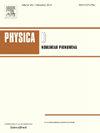基于神经常微分方程的动力系统局部流形逼近
IF 2.7
3区 数学
Q1 MATHEMATICS, APPLIED
引用次数: 0
摘要
在本文中,我们提出了一种创新的数据驱动方法,利用神经常微分方程(节点)的最新进展来学习动力系统并执行局部流形逼近。这种方法能够捕捉复杂非线性系统的潜在演化机制,即使只有观测数据可用。我们首先构建一个由神经网络驱动的NODE模型,然后利用观测数据对其进行训练,学习未知非线性系统的向量场。这允许其局部流形的近似和预测。建立了用节点逼近局部流形的通用逼近定理,并通过严密的数值实验验证了该方法逼近非线性系统局部流形的能力。此外,我们还探讨了网络结构、复杂性和训练数据等因素如何影响近似性能。最后,我们评估了基于节点的流形逼近在各种噪声条件下的鲁棒性,展示了其在现实场景中的泛化能力和弹性。本文章由计算机程序翻译,如有差异,请以英文原文为准。
Local manifold approximation of dynamical system based on neural ordinary differential equation
In this paper, we present an innovative data-driven method that leverages the latest advancements in Neural Ordinary Differential Equations (NODEs) to learn dynamical system and perform local manifold approximation. This approach enables the capture of the underlying evolution mechanisms of complex nonlinear systems, even when only observational data is available. We first construct a NODE model, which is powered by a neural network, and then train it using the observational data to learn the vector field of the unknown nonlinear system. This allows for the approximation and prediction of its local manifold. We establish a universal approximation theorem for the local manifold approximation using NODEs, and through rigorous numerical experiments, we validate the method’s ability to approximate the local manifolds of nonlinear systems. In addition, we explore how factors such as network structure, complexity, and training data influence the approximation performance. Finally, we assess the robustness of NODE-based manifold approximation under various noisy conditions, demonstrating its generalization ability and resilience in real-world scenarios.
求助全文
通过发布文献求助,成功后即可免费获取论文全文。
去求助
来源期刊

Physica D: Nonlinear Phenomena
物理-物理:数学物理
CiteScore
7.30
自引率
7.50%
发文量
213
审稿时长
65 days
期刊介绍:
Physica D (Nonlinear Phenomena) publishes research and review articles reporting on experimental and theoretical works, techniques and ideas that advance the understanding of nonlinear phenomena. Topics encompass wave motion in physical, chemical and biological systems; physical or biological phenomena governed by nonlinear field equations, including hydrodynamics and turbulence; pattern formation and cooperative phenomena; instability, bifurcations, chaos, and space-time disorder; integrable/Hamiltonian systems; asymptotic analysis and, more generally, mathematical methods for nonlinear systems.
 求助内容:
求助内容: 应助结果提醒方式:
应助结果提醒方式:


